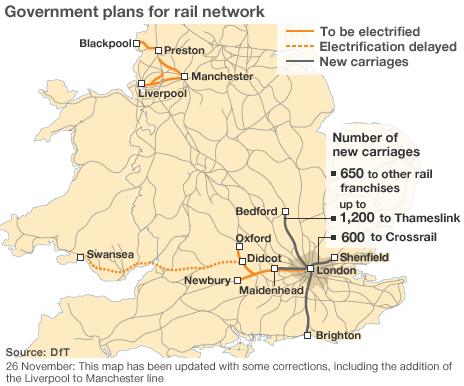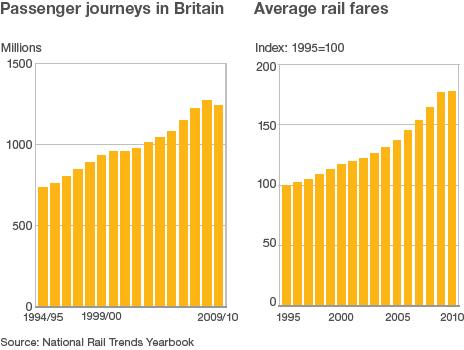Railways to get £8bn investment
- Published
The Transport Secretary Philip Hammond explained the plans
Plans for £8bn of investment in Britain's railways have been announced by the government.
The government is buying about 2,000 new carriages to tackle overcrowding, electrifying some lines, and pressing ahead with the Thameslink programme.
Yet only 650 of the new carriages will be available by 2014 - less than the 1,300 announced by the last government, while Thameslink is delayed two years.
Labour has called the plans "nothing more than one long series of delays".
Meanwhile, proposals to modernise the London-Swansea line are still on hold and it will be the end of the decade before the investment is complete.
Passengers also face above-inflation rises in ticket prices to help pay for the investments.
Commons spat
"Commuters will see their fares rise by 3% above inflation next year and they now face waits of up to a decade for the new trains that will ease overcrowding and speed up journeys," said the shadow transport secretary, Maria Eagle.
She also accused the government of delaying Crossrail and the Thameslink upgrade, as well as the replacement of the old Intercity 125 long distance trains.
Her comments came in response to the official announcement of the plans in the House of Commons by Transport Secretary Philip Hammond.
Defending the plans, Mr Hammond said the last government's promise of new rolling stock amounted to "not so much a plan as a press release".
The minister acknowledged that the decision to raise the regulatory cap on fare increases was bad news for commuters.
"But this is one of the tough decisions that we have had to make in order to protect the investment programme in our railways," he said.
Details of the plans include:
delivering more than 2,100 new rail carriages by May 2019, increasing capacity by 17%, creating space for an extra 185,000 passengers
650 of these carriages will be delivered by 2014; the previous Labour government had promised 1,300
up to 1,200 carriages for the Thameslink programme (Bedford to Brighton through London) although the programme will be completed two years later than planned
600 carriages for the Crossrail project (east to west through London)
electrification of commuter services on the Great Western route between London and Didcot, Oxford and Newbury over the next six years
electrification of the lines between Liverpool, Manchester, Preston and Blackpool
but electrification of the London-Swansea line has been delayed.

'Smoke and mirrors'
Patrick Butcher, finance director at Network Rail, which owns all of Britain's rail infrastructure, was pleased with the announcement.
"We welcome the fact that the government recognises that the railway plays an important role in driving economic growth and this investment proves that," he said, after Network Rail announced half-yearly profits of £299m - more than double the amount it made in the same period last year.
Bob Crow, general secretary of the RMT union, called the plans "classic political smoke and mirrors".
"The reality is that the inflation-busting fare increases kick in within weeks while the infrastructure and upgrade works we need to drag the UK's railways out of the slow lane are light years away," he said.
New carriages
The government had put many rail investment schemes on hold while it decided which it could afford in the face of budget cuts. It has now been announced that more than 2,000 new carriages are being bought, with 1,850 of them being used to provide extra capacity.
Those carriages will not arrive instantly though - they will not finish coming into service until 2019.
Transport Secretary Philip Hammond admitted that it was a "rolling programme" but said passengers would start to see the benefits "within the next few months".
Some 600 of the new carriages are for Crossrail - the new line being built east-west across London. There are also up to 1,200 for Thameslink, the north-south link across London, and 650 will be given to different franchises around the country.
Those 650 carriages will be used to serve commuters travelling into the big cities.
But the government cannot say precisely which franchises will get what.

Although the new carriages will be given to the franchises, and represent good news for passengers - the train companies will want extra money from the government to run them.
So ministers will now negotiate with franchises to get the best deal they can - and that will determine in part where the carriages go.
Those carriages will increase capacity on the network by 17%, enabling an extra 185,000 passengers to be carried at any one time.
Electric trains
The Thameslink project is also going to go ahead in full. This will eventually double capacity on the route from Brighton to Bedford, allowing up to 24 trains an hour.
Dave Garrett says ticket price hikes mean cutbacks in family life
Work on the scheme is already under way, but there had been question marks over whether the rest of the stages would go ahead.
It will not be completed though until 2018 - two years later than planned. That delay means the engineering work is easier, and cuts costs.
There is also news that lines in the north west from Manchester to Liverpool and Manchester to Blackpool are going to be electrified.
Electric trains have an operating cost roughly half that of their diesel equivalents. They are also more reliable and can fit more passengers on board.
Fare rises
But the long-awaited electrification of the London to Swansea Great Western route is still not happening.
The government is deciding whether to replace the intercity fleet with electric trains, or electric-diesel hybrids. Whatever it decides will determine what happens to the electrification of the route into south Wales.
Meanwhile, passengers face an average fare rise of 6.2% in the new year, with some commuters seeing their tickets go up by as much as 12.8%.
The government says these fare rises are necessary to safeguard the investment that has just been announced.
Rail customer watchdog Passenger Focus said passengers would welcome the investment plans.
"This is just what rail passengers want to see - long-term, sustained investment. It also gives passengers a clue where some of their fare rise money will be going," the watchdog's chief executive Anthony Smith said.
But he added the industry would have to continue to work hard to deliver "a value for money service".
- Published25 November 2010
- Published25 November 2010
- Published25 November 2010
- Published23 November 2010
- Published9 November 2010